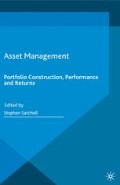Abstract
Increasing attention is being paid to the performance of institutional funds; whether public or private, large or small, well-governed or not, these institutions have come to play crucial roles in under-writing the welfare of many citizens of developed and developing countries. In terms of the volume of assets managed by these institutions, it is estimated that, as of 2006, across the world pension funds accounted for $US25,000bn, endowments and foundations $4bn, and the emerging sovereign funds $4bn.1 The price of poor performance is very high (as is noted by many commentators and academics; see Ambachtsheer (2007a) and Lerner et al. (2007)). Inevitably, institutional performance is conditioned by the inherited practices of various bodies that are responsible for these funds. At the same time, we should not be content with simply relying upon the past for the future.
Access this chapter
Tax calculation will be finalised at checkout
Purchases are for personal use only
Preview
Unable to display preview. Download preview PDF.
References
Ambachtsheer, K. (2007a) Pension Revolution: A Solution to the Pensions Crisis, John Wiley, New York.
Ambachtsheer, K. (2007b) ‘The Three Grades of Pension Fund Governance Quality: Bad, Better, and Best’, mimeo, Rotman International Center for Pension Management, University of Toronto, Toronto.
Ambachtsheer, K., Capelle, R. and Lum, H. (2007) ‘The State of Global Pension Fund Governance Today: Board Competency still a Problem’, mimeo, Rotman International Center for Pension Management, University of Toronto, Toronto.
Black, B. (1992) ‘Agents Watching Agents: The Promise of Institutional Voice’, UCLA Law Review, 39, 811–893.
Clark, G. L. (2003) European Pensions & Global Finance, Oxford University Press, Oxford.
Clark, G. L. (2004) ‘Pension Fund Governance: Expertise and Organisational Form’, Journal of Pension Economics and Finance, 3, 233–253.
Clark, G. L. (2006) ‘Regulation of Pension Fund Governance’, in G. L. Clark, A. Munnell and M. Orszag (eds.) Fhe Oxford Handbook of Pensions and Retirement Income, Oxford University Press, Oxford, 483–500.
Clark, G. L. (2007a) ‘Expertise and Representation in Financial Institutions: UK Legislation on Pension Fund Governance and US Regulation of the Mutual Fund Industry’, 21st Century Society: Journal of the Academy of Social Sciences, 2, 1–23.
Clark, G. L. (2007b) ‘Governing Finance: Reconciling Functional Performance with Stakeholder Representation’, Working Paper 07–08, Oxford University Centre for the Environment, Oxford.
Clark, G. L., Caerlewy-Smith, E. and Marshall, J. (2006) ‘Pension Fund Trustee Competence: Decision Making in Problems Relevant to Investment Practice’, Journal of Pension Economics and Finance, 5, 91–110.
Clark, G. L., Caerlewy-Smith, E. and Marshall, J. (2007) ‘The Consistency of UK Pension Fund Trustee Decision-Making’, Journal of Pension Economics and Finance, 6, 67–86.
Clark, G. L. and Monk, A. H. B. (2008) ‘Conceptualizing the Defined Benefit Pension Promise: Implications from a Survey of Expert Opinion’, Benefits Quarterly, 24, 7–18.
Clowes, M. J. (2000) Fhe Money Flood: How Pension Funds Revolutionized Investing, Wiley, New York.
Cocco, J. F. and Volpin, P. F. (2007) ‘Corporate Governance of Pension Plans: The UK Evidence’, Financial Analysts Journal, 63(1), 70–83.
Engel, C. and Weber, E. U. (2006) ‘The Impact of Institutions on the Decision How to Decide’, MPI Collective Goods Preprint No. 2006/19. Available at SSRN: http://ssrn.com/abstract=93502.
Gertler, M. S. (2001) ‘Best Practice? Geography, Learning and the Institutional Limits to Strong Convergence’, Journal of Economic Geography, 1, 5–26.
Jensen, M. (2000) A Theory of the Firm: Governance, Residual Claims, and Organizational Forms, Harvard University Press, Cambridge, MA.
Kahneman, D. and Tversky A. (1979) ‘Prospect Theory: An Analysis of Decisions Under Risk’, Econometrica, 47, 263–291.
Langbein, J. (1997) ‘The Secret Life of a Trust: The Trust as an Instrument of Commerce’, Yale Law Journal, 107, 165–189.
Lerner, J., Schoar, A. and Wongsunwai, W. (2007) ‘Smart Institutions, Foolish Choices: The Limited Partner Performance Puzzle’, Journal of Finance, 62, 731–764.
Merton, R. and Bodie, Z. (2005) ‘The Design of Financial Systems: Towards a Synthesis of Function and Structure’, Journal of Investment Management, 3, 1–23.
North, D. C. (1990) Institutions, Institutional Change and Economic Performance, Cambridge University Press, Cambridge.
O’Barr, W. and Conley J. (1992) Fortune and Folly, Wiley, New York.
Roberts, J. (2004) The Modern Firm: Organizational Design for Performance and Growth, Oxford University Press, Oxford.
Roe, M.J. (2006) ‘Legal Origins, Politics, and Stock Markets’, Harvard Law Review, 120, 460–527.
Shiller, R. J. (2002) ‘Bubbles, Human Judgement, and Expert Opinion’, Financial Analysts Journal, 58(3), 18–26.
Sunstein, C. (2005) ‘Group Judgements: Statistical Means, Deliberation, and Information Markets’, New York University Law Review, 80, 962–1049.
Urwin, R. (1998) Avoiding Disappointment in Investment Manager Selection, International Association of Consulting Actuaries, London.
Urwin, R., Breban, S., Hodgson, T. and Hunt, A. (2001) ‘Risk Budgeting in Pension Investment’, Annals of the Faculty of Actuaries, 7, 319–364.
Wagner, R. K. (2002) ‘Smart People Doing Dumb Things: The Case of Managerial Incompetence’, in R. J. Sternberg (ed.), Why Smart People Can Be So Stupid, Yale University Press, New Haven, 42–63.
Watson Wyatt (2004) Remapping, Reigate.
Watson Wyatt (2006) Changing Lanes, Reigate.
Williamson, O. (1996) The Mechanisms of Governance, Oxford University Press, Oxford.
Author information
Authors and Affiliations
Editor information
Editors and Affiliations
Rights and permissions
Copyright information
© 2016 The Editor(s)
About this chapter
Cite this chapter
Clark, G.L., Urwin, R. (2016). Best-Practice Pension Fund Governance. In: Satchell, S. (eds) Asset Management. Palgrave Macmillan, Cham. https://doi.org/10.1007/978-3-319-30794-7_13
Download citation
DOI: https://doi.org/10.1007/978-3-319-30794-7_13
Publisher Name: Palgrave Macmillan, Cham
Print ISBN: 978-3-319-30793-0
Online ISBN: 978-3-319-30794-7
eBook Packages: Economics and FinanceEconomics and Finance (R0)

